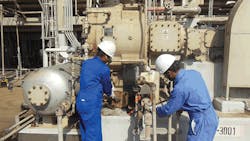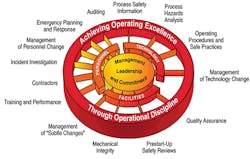Culture Is Key to Improving Safety Performance
For companies that operate under hazardous conditions day in and day out, such as those in the oil and gas sector, safety must play a fundamental role in business operations. Protecting lives and property, both at an oil and gas facility and in surrounding communities, does more than simply impact profitability and reputation – it can impact a company's very right to operate.
Certainly, having effective processes in place is important to reduce incidents and risk of injury. These processes help guide safe operations and maintain compliance with established regulations, but over time their effectiveness can be eroded by complacency and lack of organizational commitment. The longer a facility operates without an incident occurring, the more likely it is that important safety processes get skipped and training opportunities get ignored, which can result in disaster.
Effective and sustainable safety performance requires more than adherence to a checklist. It also requires establishing a company-wide culture in which every employee, from floor managers to shift employees to outside contractors, shares a commitment to safety. Just as critical is visible involvement by the organization's leadership, making the ongoing pursuit of safe operations a core value within a company and establishing expectations that are understood, accepted and practiced.
This was the case for Saudi Aramco Base Oil Co.-Luberef, which, through its two refineries at Jeddah and Yanbu, supplies base oil to more than 15 nations and various companies such as Shell, Mobil, Caltex, Fuchs and Petromin Corp. In anticipation of a planned expansion at its Yanbu site that would significantly increase production capacity, Luberef wanted to develop a systematic approach to its safety management across all facilities and knew that changing the company culture with respect to safety needed to be the first order of business.
Hussam Al-Johani, an inspection engineer at Luberef, was aware of the poor safety culture that existed at the facilities. "People were afraid to report unsafe conditions," he said. "They would bypass procedures or safety requirements in order to save time. People would only follow safety rules in front of officials."
Luberef's safety and security manager at the time, Samir Khan, acknowledged there was a cultural problem within the company that needed to be overcome. "One could say that safety used to be ‘policed,'" Khan said. "Safety was a discipline issue and considered to be the sole responsibility of the safety department. It was very hard to make people realize that safety is everyone's responsibility."
DuPont Sustainable Solutions (DuPont) had developed a successful manager and supervisor-training module for Luberef in 1994, and DuPont was again engaged by Luberef to study the oil company's culture and develop an improved approach to safety management.
The Initial Assessment
DuPont conducted a thorough evaluation of Luberef's production sites in 2011 and determined that if the organization was going to successfully change its approach to safety management, it needed to stop focusing only on reactive indicators and begin to concentrate on predictive or proactive indicators of risk. In other words, Luberef needed to evolve its safety management system from one that was reactive to one that was proactive.
At the time, Luberef had a high potential for incidents to occur. This would not be changed by simply addressing the efficiency of the current safety management system. Luberef needed to begin acting on risks that were identified by improving incident reporting throughout the organization, executing first- and second-party system audits and instituting a behavioral observation program. But the critical component to make this change possible was the strong, visible commitment of Luberef leadership.
To begin to build a more fully integrated safety management system throughout Luberef, specific recommendations included:
- Developing key safety leadership competencies;
- Establishing a safety management system based upon best practices;
- Implementing safety training across all levels of the organization;
- Establishing a self-maintaining safety management structure;
- Changing existing incident reporting processes; and,
- Moving from only tracking lagging indicators to also measuring leading indicators.
Changing the Mindset: Engaging Employees
The effort began with training for every employee at every level of Luberef. Luberef personnel were introduced to the key elements of operational risk management (see Figure 1). Each element was assigned to a Luberef task team with a project leader.
DuPont supported Luberef in its internal development of each of the 22 elements, ranging from incident investigation and process hazard analysis to quality assurance and operating procedures, and trained the task teams in best practices so that they could in turn pass on these learnings to the wider Luberef staff. The elements were introduced sequentially, with the final team, which was responsible for emergency preparedness and planning, starting in December 2014.
Because active involvement of the Luberef senior leadership was critical to success, DuPont developed a program to reflect its commitment to the new safety program. Senior leadership now visibly championed all safety programs, participating in regular safety observation visits and audits. To help reinforce their commitment, safety became part of employee performance indicators, formal appraisals and job plans. Even employee bonuses are now linked to achieving safety targets. In 2014, achievement of safety KPIs accounted for 25 percent of employees' bonus payments.
"Luberef showed real commitment, not just through active participation of the senior leadership in regular safety observation visits and audits, but also by introducing all process safety elements during the design and construction phase of the projects and by including almost a third of its workforce on project teams," said Alan Walton, the DuPont project manager leading the team advising Luberef.
Ongoing reinforcement and training in risk management and safety also were important to the long-term success of the program. DuPont assisted Luberef with implementing e-learning programs and annual recertification requirements. Various awareness efforts also were developed. Regular safety meetings now are held by individual Luberef teams, and more informative incident log sheets were designed for use by the teams.
To help the company begin to identify potential risks and apply these learnings across the organization, processes were instituted to improve incident reporting and to implement regular system audits. These learnings also were integrated into pre-startup safety reviews (PSSRs) to help mitigate risks before new units ever came online.
Ibrahim Al-Faqeeh, vice president of manufacturing at Luberef, noted that building a culture of safety didn't happen overnight, but with time, it began to take hold. "People did resist," he admitted. "To convert people, you have to be patient. You have to make them understand that everything has something to do with safety. Nothing is outside of the safety framework."
Visible Change
Luberef's increased focus on safety performance has yielded strong results. By November 2014, both the Jeddah and Yanbu facilities operated for more than 7 million hours without incident. By December 2014, the total process safety incident rate (CAT C) had dropped 75 percent and the total recordable injury rate, for both employees and contractors, was reduced 100 percent. In addition, the environmental incident rate and the total occupational health incident rate both stood at zero, while the mechanical availability of Luberef's sites were operating at 98 percent. This improved safety performance has translated to increased productivity and output within the company.
Achieving measurable progress in safety performance requires transforming an organization's culture to one in which leadership and employees alike consider safe operations a fundamental organizational value, not just a matter of compliance. Despite the clear progress Luberef has made toward this transformation, the company understands the pursuit of safety is a never-ending process.
"I have come to realize that safety is not a destination, but a journey," said Al-Faqeeh. "You cannot change people overnight. However, I know now that there is no way back. We have passed the critical stage and so many people are now committed to the new safety process that we will keep improving."
Johan Van Der Westhuyzen is managing director for Turkey, Middle East and North Africa for DuPont Sustainable Solutions.

